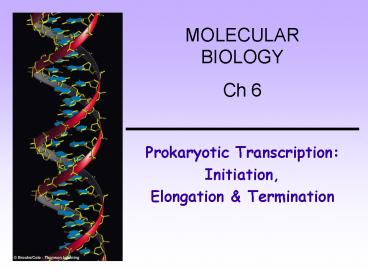Prokaryotic Transcription: - PowerPoint PPT Presentation
1 / 25
Title:
Prokaryotic Transcription:
Description:
Title: PowerPoint Presentation - Presentation Slides for Essentials of Genetics, Second Edition Author: Dr. Kenneth Martinelli Last modified by – PowerPoint PPT presentation
Number of Views:108
Avg rating:3.0/5.0
Title: Prokaryotic Transcription:
1
MOLECULAR BIOLOGY Ch 6
- Prokaryotic Transcription
- Initiation,
- Elongation Termination
2
(No Transcript)
3
SDS PAGE
RNA Polymerase Holoenzyme
holoenzyme
sigma
core
-
?'
?
?
4
Viral Transcription immediate early genes,
delayed early genes, late genes Sigma Factor -
directs the core to transcribe specific
genes hybridization-competition experiment -
holoenzyme specific for immed. early genes -
core enzyme transcripts compete w/ all genes
5
Hybridization-Competition Experiment
6
Transcriptional INITIATION
Sigma stimulates tight binding between RNA
polymerase and promoter Experiment
- labeled DNA core or holo. - added
unlabeled DNA - filtered the mixture
7
(No Transcript)
8
Electron Microscopy on 2-D Crystals
9
Sigma aids in DNA melting in promoter region
- creates tighter binding of RNA Pol to promoter
region
10
Tight binding of RNA Pol to promoter is Temp
dependent
11
Sigma factor can be recycled (reused)
- exper
- holoenzyme DNA
- wait 10 min
- (initiation ceased)
- add rifampicin-resistant
- core enzyme rifampicin
(rifampicin normally prevents first
phosphodiester bond formation)
12
Consensus Sequence of Promoter Regions
-35 TTGACa
-10 TAtAaT
- up mutations strongest - down mutations
weaker - in/dels between boxes deleterious
13
UP Element in strongest promoters - seen
upstream to E. colis 7 rRNA genes -
stimulates transcription 30X
? subunit - recognizes UP element - C-term.
end binds to UP element
14
Fis sites act as enhancers
- binding sites for activators (TAP-Fis) -
between -60 -150
15
4 Homologous Regions of Sigma Factor
Region 1 ?70 ?43 between 12 245 a.a.
deletion in ?43 - cannot loosen binding between
nonpromoter region and RNA Pol (needs ?
factor)
16
Region 2 highest homology (2.1) hydrophobic,
binds to core (2.4) binds to -10 box (has a
helix) Region 3 ? (helix - turn - helix)
Region 4 (4.2) binds to -35 box
(helix-turn-helix)
17
helix-turn-helix motif
18
Transcriptional ELONGATION
RNA Polymerase
ß subunit - phosphodiester bond formation -
determinant of rifampicin streptolydigin -
sensitivity or resistance - weak bonding at
melted DNA zone (active site) and
downstream binding
(streptolydigin stops elongation of
transcription)
19
Transcriptional ELONGATION
Zinc Fingers
- RNA Polymerase
- ß subunit
- most charged of all subunits
- zinc finger motif
- strong binding downstream
- of active site
20
Zinc Fingers within Major Groove of DNA
21
Models of Transcription Elongation
- more than likely RNA Pol moves in straight
line w/ topisomerases relieving supercoils -
RNA/DNA hybrid forms for 20 bases - 40 nt/sec
(prok)
22
TERMINATION of Prok. Transcription
DNA sequences (palindrome) signal termination
5 3 A T A C T T G A C G T A C A A G
T A T T A T G A A C T G C A T G T T C A T
A 3 5
RNA made
10 structure
20 structure
5-AUACUUGACGUACAAGUAU-3
23
Types of Prok. Transcription Termination
Mechanisms
1) Rho- (Rho independent) - template strand
16-20 bases upstream of term. pt has an
inverted repeat followed by poly As
24
Types of Termination Mechanisms
2) Rho (Rho dependent) - template strand with
inverted repeat but no poly As following -
Rho protein decreases net rate of transcription
25
Rho-Dependent Termination of Prok.Transcription
- Rho binds to RNA
- releases transcript
- from DNA template
- Rho has no effect on
- initiation

